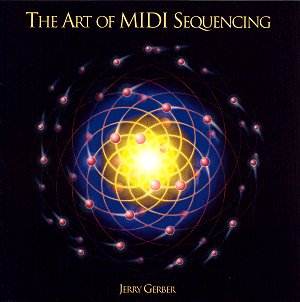Comparison Recordings:
Digital Moonscapes, Wendy Carlos, synthesizers - East Side
Digital 81542
Thereís a Bird in My Fingerprint, Robert
Vassar, synthesizers - Initium 3002
Mr. Gerberís title is somewhat presumptuous for
it seeks to give the impression that his is a unique or at least
defining capability. In fact I know of at least four others who
are doing the same thing with entirely comparable skill in a classical
music style and dozens who work in the pop/New Age style. That
is my point in reviewing this disk along with two similar comparison
recordings. The subject recording and the comparison recordings
all have in common that they are produced on computer sequencer
controlled electronic music synthesisers. Each is the work of
a single person combining the functions of composer and performer.
All are presented on "vanity" record labels, that is,
the artist owns a piece of the label.
Gerber and Vassar utilize sampler technology,
but Carlos matched instrument sounds with constructed digital
sounds; by far the most tedious way of doing it, but the end result
is virtually the same. What we have here, in other words, is a
composer writing the music, performing it and selling the recording.
Few middle-persons are involved if any. Carlos certainly has the
most visible reputation, and that recording was originally released
on CD in the US by a major label. It is now only available on
this private label issue. The music on all these disks is, or
could be, written down in conventional score and could be performed
by real live performers (in Mr. Gerberís case we would also need
a sound effects artist), should they care to do so. So, technically
speaking this is not electronic music. It is conventionally written
music performed utilising recordings of real (or very realistically
matched) musical instruments assembled by a computer under the
control of a Ďconductorí who is also the composer.
The personalities involved here are certainly
diverse. Carlos was a physics major when captured by music, joining
the Columbia-Princeton Electronic Music Center, and finally producing
the outrageously popular LP "Switched on Bach" in 1968.
This album arguably began the whole thing as a public idea, utilising
the relatively primitive technology of the time. Robert Vassar
was born in Idaho and is a retired computer engineer and self-taught
musician and Mozart scholar. Like Carlos, Vassar builds his music
voice by voice, and his orchestra, like Stravinskyís, tends to
be a collection of chamber ensembles with much use of piano. It
was Gerberís reference to cannabis in the third movement of his
Symphony that suggested to me this comparison with Mr. Vassarís
"Morphean Fantasy," one of the selections on the album
described above. That derives from dreams occurring during anaesthetised
recovery from major surgery, chief among which was the mysterious
bird in his fingerprint which gives the album its title. Gerber
is a member of the California commercial music industry, working
from the Ďorchestral soundí on downwards. If his music sounds
like movie music itís probably because heís written a lot of it.
All three of these artists have produced numerous
disks of their music; Vassar only two with a third on the way.
That Mr. Vassar is a friend of mine is not the only reason I speak
well of him. Rather it is that we became friends in part because
I admire his music, and that music will certainly stand comparison
with the best of them. Carlosís suite of pieces invites comparison
with Holstís Planets, but that is unfortunate for here
is none of the grandeur, mystery, richness, rhythmic integrity
or exquisite tunefulness of Holst. This release does sound sort
of like a real symphony orchestra and the music is at times entertaining
even if you canít remember a note of it afterwards.
Mr. Gerber is very active in the "San Francisco"
music scene and that explains a great deal about him. One musical
directory website includes Mr. Gerber not in its "Classical
Composer" section, but in the category of "New Music,
Film Music, Electronic, Pop, Arranger". Accordingly one is
not surprised when the first movement of the his Symphony
sounds like StarGate goes Saturday Night Live, but he does have
the best string section patch Iíve ever heard - even better than
Carlosís. He also has some very fine human voice samples, but
virtually everything else sounds fakey, rather like a small electric
organ. Lament, which isnít very, features a New Age moonbeam
chorus and a few skyrockets fly through the room. The third movement
is entitled "Joy of Cannabis", but Mr. Gerber apparently
combines meth with his smokes and his cannabis trip sounds like
Aaron Copland meets the Chorus line on Broadway. With the fourth
movement itís StarGate takes a short trip on the BART or maybe
in a fast machine. The Essay is Gerberís best selection
on the disk. Except for a few vaguely orchestral episodes itís
pure New Age in style, but not spooky enough to be successful
in that genre. I think this is not so much crossover music as
something that got stuck outside with nowhere to go. In words
written in another context by a more distinguished critic (Raymond
Tuttle writing in Fanfare) than I, is Gerberís compositional
style bland and aimless? Is his sense of form obscure? Are his
melodies undistinguished? Or is it only that they sound that way?
In this horse race Vassar is the clear winner,
with Carlos not too far behind, even if that isnít what we set
out to talk about. Initium CDs are available direct from Initium,
28140 Hop Road, Caldwell, Idaho 83607 USA, (208) 455-8604. The
other disks are currently commercially distributed.
Paul Shoemaker

![]() Jerry Gerber, sequencer
controlled electronic music sampler synthesizers
Jerry Gerber, sequencer
controlled electronic music sampler synthesizers ![]() OTTAVA 03-007 [67.27]
OTTAVA 03-007 [67.27]